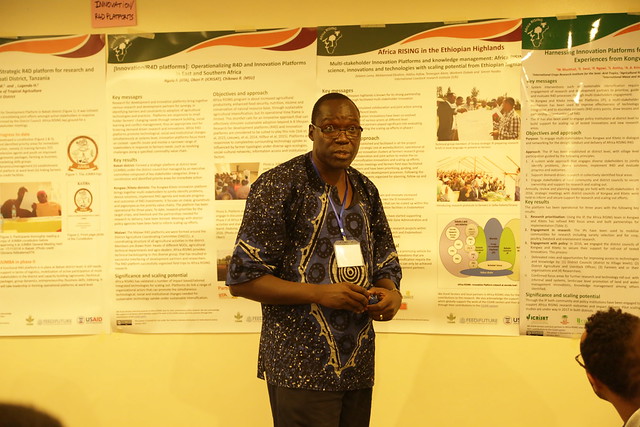Innovation and R4D platforms in Africa RISING: questioning sustainability
During the first phase of the Africa RISING program (2012-2016) the three projects (West Africa, East and Southern Africa and the Ethiopian highlands) employed various way to learn, share and collaborate. One of the ways was to establish Innovation or R4D platforms at various levels. Though the names of the platforms varied, they were used interchangeably promote stakeholder engagement and ownership, cooperation, co-learning and joint action. The first phase program document clearly indicated the importance of these platforms:
“Since system interventions require the engagement of various research and development partners, operating in the context of specific components within these systems, proper means for meaningful and effective interactions are needed to prioritize, guide, and evaluate the various research and development processes within Africa RISING….. The platforms will design, implement, evaluate project activities and disseminate and communicate research findings”.

The recent Africa RISING program Science for Impact Workshop was a time to look at how these platforms were used in the first phase and how they should evolve in the second phase (2017-2021). The discussion was through a bus stop format where participants were divided up in to interest groups (Farmers, Extension Officer, Scientists, Government representatives, Private sector, NGOs – implementers), seeing the platforms from different perspectives.
Clear platform ‘positives’ were identified
• They bring stakeholders together that share similar visions
• They are good to engage stakeholders to address farmer needs
• They guide the rollout of technologies
• They are good ways to reach target audiences, such as farmers
• They can mobilise joint efforts among active stakeholders
• The support sharing and learning
Some challenges were also identified:
• They struggle to engage the private sector
• Membership often changes frequently, especially of government officials, leading to discontinuities
• It is not easy to make sure that knowledge is transferred to all the members
• To what extent to they really influence and shape research, or just facilitate research ‘rollout’.
Above all, one recurring issue concerned the sustainability of the platforms:
• Should they be sustained after the projects phase out?
• Who will take ownership after the projects phase out?
• Who will pay for them?
• Shall we leave it so they evolve by themselves?
There were so clear single answers to these questions. They need to be addressed on a case by case basis and used to inform the Africa RISING program second phase activities in this area.
See four posters from the worskhop:
Lema, Z., Ebrahim, M., Asfaw, A., Alene, T., Dubale, W. and Yasabu, S. 2017. Multi-stakeholder Innovation Platforms and knowledge management: Africa RISING science, innovations and technologies with scaling potential from the Ethiopian Highlands. Poster prepared for the Africa RISING Science for Impact Workshop, Dar es Salaam, 17-19 January 2017. Nairobi, Kenya: ILRI.
Munthali, W., Swai, E., Ngowi, P., Anitha, S., Kimaro, A.A., Rubanza, C., Jumbo, B., Makumbi, D. and Okori, P. 2017. Harnessing innovation platforms for sustainable intensification R4D experiences from Kongwa and Kiteto, Tanzania. Poster prepared for the Africa RISING Science for Impact Workshop, Dar es Salaam, 17-19 January 2017. Patancheru, India: ICRISAT.
Ngulu, F., Okori, P. and Chikowo, R. 2017. Operationalizing R4D and innovation platforms in East and Southern Africa. Poster prepared for the Africa RISING Science for Impact Workshop, Dar es Salaam, 17-19 January 2017. Ibadan, Nigeria: IITA.
Ngulu, F., Bekunda, M. and Lugendo, H. 2017. JUMBA—Strategic R4D platform for research and development in Babati District, Tanzania. Poster prepared for the Africa RISING Science for Impact Workshop, Dar es Salaam, 17-19 January 2017. Ibadan, Nigeria: IITA.




